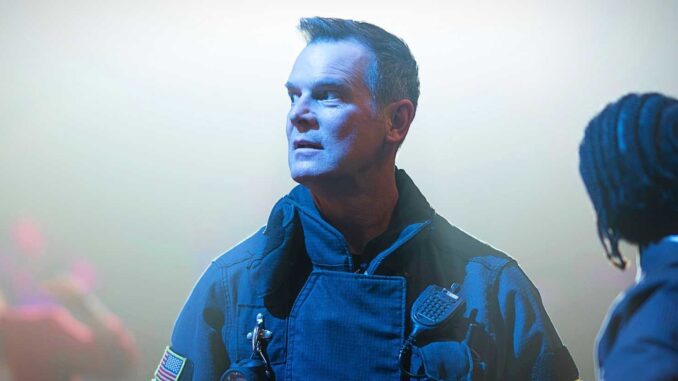
Without question, 9-1-1 season 9 must move on from Bobby’s death. The incessant backlash following the character’s departure shows no sign of slowing down, and how 9-1-1 handles Bobby’s legacy could make or break the series. Yet, utilizing a time-jump may make matters worse. The alternative would be to lean into Bobby’s death and give the characters time to grieve. In a way, that would let the audience grieve as well, hopefully giving 9-1-1 a fighting chance to recuperate its formerly-avid fan-base. Unfortunately, 9-1-1 season 9 will most likely fall in between, avoiding Bobby’s death without the time-jump to make it feel earned.
If you’re a die-hard 9-1-1 fan, you already know how gut-wrenching Bobby Nash’s death in Season 9 was. It didn’t just shake the characters—it hit viewers like a wrecking ball. The loss of Bobby, the firehouse’s rock, left a gaping hole that still doesn’t feel real. But here’s the kicker: Did the show really do justice to his legacy?
The Emotional Fallout: Fans Are Still Reeling
After Bobby’s sudden departure, fans expected a grief arc that would honor his memory. Instead, what we got felt… rushed. The pain was there, but not explored deeply enough. The narrative seemed more interested in moving on than mourning.
Buck, Athena, and Chimney: The Grief That Wasn’t Fully Explored
Buck: More Than A Brother-In-Arms
Buck and Bobby shared a bond deeper than most on-screen friendships. Yet, Buck’s reaction was diluted. A breakdown here, a memory there—then back to work. Where was the soul-searching? Where was the real trauma?
Athena: Love Lost, But Where Was The Depth?
Athena, Bobby’s wife, was portrayed as strong. But grief isn’t always stoic. Viewers were expecting vulnerability, heartbreak, flashbacks—the whole emotional spiral. Instead, Athena seemed sidelined in her own love story’s tragic end.
Chimney: Loyal But Muzzled
Chimney has always been a voice of reason and emotion. But his response felt scripted, not organic. He should’ve been a central figure in healing the team. Instead, he was part of the background noise.
How 9-1-1 Missed The Mark
Jumping Time Lines: A Lazy Cop-Out?
A significant time jump after Bobby’s death robbed viewers of the raw aftermath. Sure, moving the story forward is necessary—but skipping grief altogether? That’s a storytelling crime.
No Legacy Moments
There should have been more: A memorial episode, deeper character reflections, unseen flashbacks of Bobby mentoring the team. Instead, his memory was like smoke—here one minute, gone the next.
What Fans Were Hoping For
A Legacy Episode
Imagine an entire episode dedicated to Bobby—his childhood, early firefighting days, becoming captain. It could’ve been narrated through letters, flashbacks, or shared memories. That would’ve hit hard—in a good way.
A Realistic Grief Timeline
We didn’t need the team to bounce back immediately. It’s okay to show the ugly side of loss: denial, anger, numbness. Let them break down. Let them fall apart. That’s how humans heal.
Athena’s Journey as a Widow
Athena deserved her own arc. A powerful woman crumbling under grief, trying to hold it together for others—now that’s real. That’s compelling. That’s what we missed.
What the Writers Could Have Done Differently
More Conversations, Less Action
Sometimes, the most powerful scenes aren’t the ones with sirens blazing. It’s the quiet talks, the shared glances, the moments of silence that speak volumes. The aftermath of Bobby’s death needed more of that.
Slow It Down
There’s a reason slow burns work. Let us feel every ounce of pain. Let each character have a moment. Grief isn’t a montage—it’s a full-blown journey.
The Psychology of Grief in TV Shows
When TV rushes through grief, it sends a dangerous message: Move on fast. But in real life? That’s not how it works. Shows like This Is Us have proven that raw, extended grief arcs resonate. 9-1-1 could’ve leaned into that—and created something unforgettable.
What Fans Are Saying Online
Scroll through Reddit or X (formerly Twitter), and you’ll see a wave of disappointment. Here are some raw takes:
-
“Bobby deserved better.”
-
“They rushed the aftermath like it was nothing.”
-
“Athena’s arc was non-existent. She’s just ‘fine’ now?”
This isn’t just criticism—it’s a call for better storytelling.
A Glimmer of Hope: Redemption Through Flashbacks?
There’s still time. Season 9 isn’t over. Writers could redeem themselves with a powerful flashback episode. One that takes us back to Bobby’s final moments, untold memories, or a letter he left behind. Closure is everything.
How Other Shows Nailed It
Grey’s Anatomy
When Derek Shepherd died, we lived through Meredith’s grief for episodes. It wasn’t pretty—but it was real.
The Walking Dead
Even in a world of zombies, Rick Grimes’ loss was handled with raw emotion and lingering impact.
9-1-1 had a similar chance. And they still might… if they slow down and give Bobby his due.

Can Grief Still Be Explored in Season 9?
Absolutely. Writers can use non-linear storytelling. Dive back into the moments right after Bobby’s death. Explore how each team member handled it. That kind of layered storytelling builds character and earns fan loyalty.
My Personal Take
As a longtime viewer, Bobby felt like more than a character. He was the show’s moral compass. Losing him was like losing the heart of the 118. And the way they brushed past his absence? It stung. But it’s not too late.
Final Thoughts: It’s Time to Do Bobby Justice
We get it—TV has to move forward. But emotional depth is what hooks fans and keeps them coming back. Bobby Nash deserved more than a tragic exit and a quick time jump. His death should’ve been the emotional anchor of the season—not just a plot device.
So… is there a better way to deal with the aftermath of Bobby’s death?
Absolutely. And the show still has time to make it right.